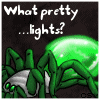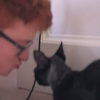A warm welcome, Annakova! Help yourself to the refreshments.
There's a rant around here somewhere about that, but I'll just reiterate. One of the most important parts of writing is to make sure that what you're saying can be easily digested by the reader, which is why saying things plainly ("white eyes stared at him through the dark") is more suggested than using prose ("two misty, glowing white lights gazed at him through the pitch black of the room"). You don't want the reader to have to stop every few words to look up something because that takes them out of the immersion of the story.
The nice thing about the word "said" is that your mind automatically skips over it in favor of who's saying it, thus keeping the flow intact. You should never underestimate "said" - it's your best friend in writing. You can use certain words in place where they fit (mumbled, screamed, whined, etc), but overall, "said" is automatically ingested and the story can continue.
So when a story is constantly using other words in place of it, that halts the reader quite often, as well as becomes obnoxious (we get it, Hunter, you're writing cats. How about you actually write cats instead of reminding us six times a page?). It's as if the writers were afraid of repeating themselves in the one place that you can and should, but ended up repeating themselves anyway.
Let's take your example:
"Hello," he lilted.
"What's up?" she growled.
"I don't know," he theorized.
"Well, let's go do something!" she threatened.
You have to stop and recognize what emotion and tone each of the descriptors are trying to convey, but if what's being said isn't actually conveying much of an important tone, then it's just a waste of everyone's time.
There's a lot that goes into writing dialog, but the one rule I should make clear is to not be afraid of "said".
Let's Read: Warrior Cats Series
-

Arcaii - Posts: 4084
- Joined: Sat Nov 07, 2009 5:11 pm
- My pets
- My items
- My wishlist
- My gallery
- My scenes
- My dressups
- Trade with me
Re: Let's Read: Warrior Cats Series
Arcaii wrote:A warm welcome, Annakova! Help yourself to the refreshments.
There's a rant around here somewhere about that, but I'll just reiterate. One of the most important parts of writing is to make sure that what you're saying can be easily digested by the reader, which is why saying things plainly ("white eyes stared at him through the dark") is more suggested than using prose ("two misty, glowing white lights gazed at him through the pitch black of the room"). You don't want the reader to have to stop every few words to look up something because that takes them out of the immersion of the story.
The nice thing about the word "said" is that your mind automatically skips over it in favor of who's saying it, thus keeping the flow intact. You should never underestimate "said" - it's your best friend in writing. You can use certain words in place where they fit (mumbled, screamed, whined, etc), but overall, "said" is automatically ingested and the story can continue.
So when a story is constantly using other words in place of it, that halts the reader quite often, as well as becomes obnoxious (we get it, Hunter, you're writing cats. How about you actually write cats instead of reminding us six times a page?). It's as if the writers were afraid of repeating themselves in the one place that you can and should, but ended up repeating themselves anyway.
Let's take your example:
"Hello," he lilted.
"What's up?" she growled.
"I don't know," he theorized.
"Well, let's go do something!" she threatened.
You have to stop and recognize what emotion and tone each of the descriptors are trying to convey, but if what's being said isn't actually conveying much of an important tone, then it's just a waste of everyone's time.
There's a lot that goes into writing dialog, but the one rule I should make clear is to not be afraid of "said".
That's one of the problems with the writing style in Twilight. The characters never "say" anything. They mumble, mutter, scream, growl, spit, whisper, laugh, etc. And even when "said" IS used, it almost always has a modifier,
previously alexterri
-

The Lion Queen - Posts: 1023
- Joined: Sun Sep 02, 2012 4:21 am
- My pets
- My items
- My wishlist
- My gallery
- My scenes
- My dressups
- Trade with me
Re: Let's Read: Warrior Cats Series
koolkatkoolkat123 wrote:Grey is the American spelling
Gray is the British spelling and this is supposed to be in England, the England with Beavers and Mountain Lions BUT we do have Badgers and Foxes
Don't know why they would mix them up though, although if you read i think its A Dangerous Path you see Tigerclaws name is like this Tgerlaw, because the word got mushed up in the printer
Grey is the British spelling, at least that's what I was taught growing up in England.
PS. This thread is awesome














.png)





.png)


-

MP3 iPod - Posts: 425
- Joined: Sat Jun 14, 2014 6:55 pm
- My pets
- My items
- My wishlist
- My gallery
- My scenes
- My dressups
- Trade with me
Re: Let's Read: Warrior Cats Series
Oops the whole thing is so dumb I can't recall which way round it is, seriously though why does the American spelling of Grey need to be different. Its not like they are said differently
And I totally agree with what you said about Twilight, Meyer must have been using a thesaurus on every word
And about said, i think it depends on the situation, if the cats are talking casually to each other then its fine but if its really tense (Say the time Windclan refused to let Bluestar travel to Highstones) then you really need to be more descriptive or those scenes would just became boring and forgettable
And I totally agree with what you said about Twilight, Meyer must have been using a thesaurus on every word
And about said, i think it depends on the situation, if the cats are talking casually to each other then its fine but if its really tense (Say the time Windclan refused to let Bluestar travel to Highstones) then you really need to be more descriptive or those scenes would just became boring and forgettable
Trying to get back into roleplaying, haven't done it for a while. I like roleplaying wolves but they have to be realistic so no alpha beta delta and especially no healer ranks. I like big cats, horses, cats. I like roleplaying warrior cats. I don't play a lot with human characters unless they're shapeshifters or dragon riders.
So if you have a roleplay that needs more members send me a PM.
So if you have a roleplay that needs more members send me a PM.
-

koolkatkoolkat123 - Posts: 32968
- Joined: Fri Jan 09, 2009 5:02 am
- My pets
- My items
- My wishlist
- My gallery
- My scenes
- My dressups
- Trade with me
Re: Let's Read: Warrior Cats Series
Hello to you, MP3! Or...iPod? I'll likely be updating later today, but I'm not too sure yet (at a family thing...gack).
I use the British spelling of "grey", for some reason (I'm American). It's probably just a separation of the languages thing - we were separated for quite some time before the internet, so we'll spell things differently.
Fun fact: the southern accent is actually closer to the original British accent than the current one.
I use the British spelling of "grey", for some reason (I'm American). It's probably just a separation of the languages thing - we were separated for quite some time before the internet, so we'll spell things differently.
Fun fact: the southern accent is actually closer to the original British accent than the current one.
-

Arcaii - Posts: 4084
- Joined: Sat Nov 07, 2009 5:11 pm
- My pets
- My items
- My wishlist
- My gallery
- My scenes
- My dressups
- Trade with me
Re: Let's Read: Warrior Cats Series
YES
I'm always looking forward to updates
oh my gosh you poor thing get away from your family families are weird
I'm always looking forward to updates
oh my gosh you poor thing get away from your family families are weird

-

sweet tooth - Posts: 8180
- Joined: Mon Jun 23, 2014 1:36 pm
- My pets
- My items
- My wishlist
- My gallery
- My scenes
- My dressups
- Trade with me
Re: Let's Read: Warrior Cats Series
Regrettably, my family is really loud and really social, and I can't even get away from them in the one room that I was lent to avoid them. I'm here for two days.
God help me.
God help me.
-

Arcaii - Posts: 4084
- Joined: Sat Nov 07, 2009 5:11 pm
- My pets
- My items
- My wishlist
- My gallery
- My scenes
- My dressups
- Trade with me
-

sweet tooth - Posts: 8180
- Joined: Mon Jun 23, 2014 1:36 pm
- My pets
- My items
- My wishlist
- My gallery
- My scenes
- My dressups
- Trade with me
Re: Let's Read: Warrior Cats Series
please help me the children are everywhere
-

Arcaii - Posts: 4084
- Joined: Sat Nov 07, 2009 5:11 pm
- My pets
- My items
- My wishlist
- My gallery
- My scenes
- My dressups
- Trade with me
Re: Let's Read: Warrior Cats Series
oh god the children those are the worst
and the relatives who wanna talk to you for 5 hours
and the relatives who wanna talk to you for 5 hours

-

sweet tooth - Posts: 8180
- Joined: Mon Jun 23, 2014 1:36 pm
- My pets
- My items
- My wishlist
- My gallery
- My scenes
- My dressups
- Trade with me
Who is online
Users browsing this forum: No registered users and 4 guests
